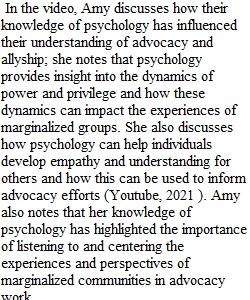


Q Overview In Modules One through Seven of this course, you will watch a series of videos from leaders within the SNHU community. The objective of these videos is to share with you some reflections and insights as they pertain to the participants’ identity, advocacy, leadership, and motivation. Watching the videos and reflecting on the content will contribute to the creation of your own social change identity. Note: As you progress through the video series and the subsequent module reflections, you will synthesize information provided from various concepts discussed within the context of the videos. Pay particular attention to specific conceptual themes that emerge from the videos. You will use the knowledge acquired in all the videos that you’ve viewed so far to complete each module reflection assignment. Prompt For this assignment, you will watch the Module Seven Video|SNHU Leadership and answer the following in 2 to 4 sentences per question. • Describe the ways in which the participants’ knowledge of psychology has shaped their orientation toward advocacy and allyship. • Describe how you can apply aspects of your learning experience to advocate for positive social change. All sources and ideas requiring attribution must be cited according to APA style. Guidelines for Submission Submit your completed Module Seven video reflection as a Word document, with sources cited according to APA style. Module Seven Video Reflection Rubric Criteria Exemplary (100%) Proficient (85%) Needs Improvement (55%) Not Evident (0%) Value Knowledge of Psychology Exceeds proficiency in an exceptionally clear, insightful, sophisticated, or creative manner Describes the ways in which participants’ knowledge of psychology has shaped their orientation toward advocacy and allyship Shows progress toward proficiency, but with errors or omissions; areas for improvement may include details related to the ways in which participants’ knowledge of psychology has shaped their orientation toward advocacy and allyship Does not attempt criterion 40 Learning Experience Exceeds proficiency in an exceptionally clear, insightful, sophisticated, or creative manner Describes how to apply aspects of learning experience to advocate for positive social change Shows progress toward proficiency, but with errors or omissions; areas for improvement may include details related to how to apply aspects of learning experience to advocate for positive social change Does not attempt criterion 40 Articulation of Response Exceeds proficiency in an exceptionally clear, insightful, sophisticated, or creative manner Clearly conveys meaning with correct grammar, sentence structure, and spelling, demonstrating an understanding of audience and purpose Shows progress toward proficiency, but with errors in grammar, sentence structure, and spelling, negatively impacting readability Submission has critical errors in grammar, sentence structure, and spelling, preventing understanding of ideas 10 Citations and Attributions Uses citations for ideas requiring attribution, with few or no minor errors Uses citations for ideas requiring attribution, with consistent minor errors Uses citations for ideas requiring attribution, with major errors Does not use citations for ideas requiring attribution 10 Total: 100%
View Related Questions